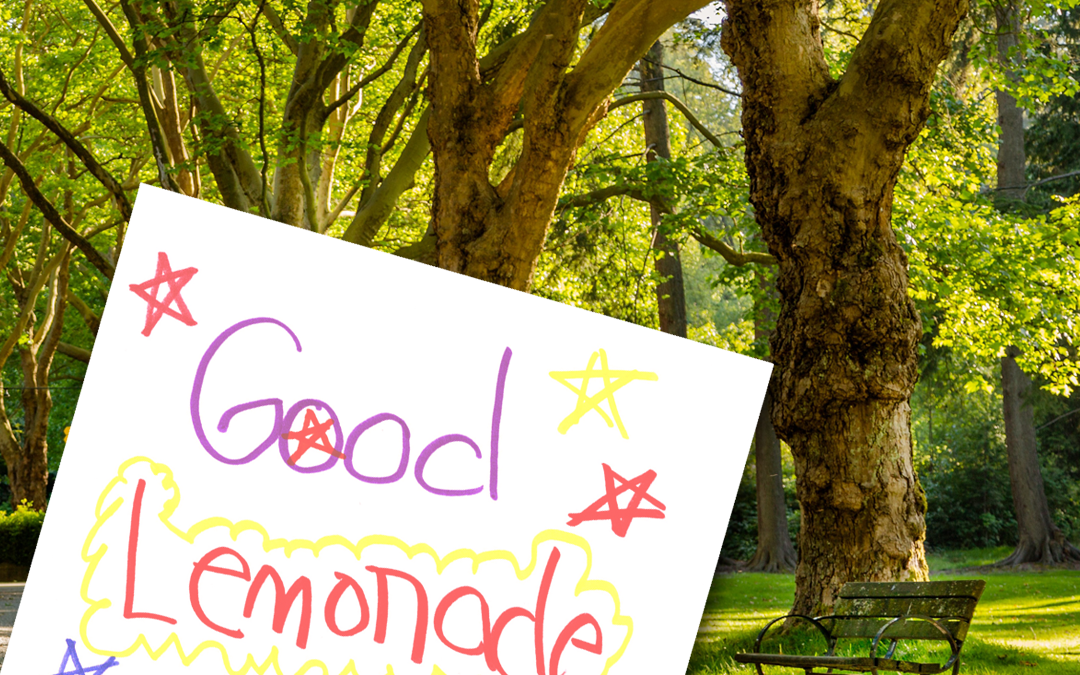I am a sucker for lemonade stands, one of my favorite forms of what might be called first-hand philanthropy. No one steps up to a child-run stand for the beverage (Crystal Light powder, anyone?), but there are so many other good reasons.
Listening to a small-town outdoor concert last summer, I noted a child of perhaps ten, with flyaway hair, going chair-to-chair with hand-drawn flyers for home-made lemonade only a block away. She and her brother, just a touch older, were set up on the sidewalk with a pitcher, a bucket of ice, and a fine businesslike manner. I was the only customer in sight. “Two, please,” I said, smiling. “That will be four dollars, ma’am.” I lingered a minute to ask what they were raising money for, thinking camp or a bike or some special treat. “Oh,” he said off-handedly, “just food. Our parents are both out of work right now. And last week, our dad was drunk and driving and had to spend the night in jail.” The girl piped up quickly, “They were wrong. He wasn’t drunk. He was just tired from helping plan our lemonade stand, and fell asleep while he was driving.” Both children were just reporting the facts of their lives, their daily weather, their situation, in response to a friendly stranger. Just normal chit-chat.
Best lemonade I ever had, and the short stack of bills I left in their tip jar is the most satisfying donation I’ve made in years. It started me thinking about the extra gratification that comes with first-hand donations, something that is not always present when you write that annual check to Something Big.
There is no doubt that our large giving systems and our big-name institutions have their place. There is work in the world that must be done on a large scale, and for that we need big systems and big buckets. I think, though, that giving can lose a little personality, a little jolt of connection, when we throw our relatively small drops into those big buckets. Direct relationship, even when momentary, reminds us that we are participants in a two-way transaction with our personal philanthropy. Recipients as well as givers. It flexes our capacity for empathy, raises our antennae for gratitude, and alerts us to everything we have in common with others. It encourages us to give again.
On that same summer journey, a few states away, I attended an Antique Tractor and Power Show. I have a weakness for vintage machinery, loving to hear it sputter and roar, imagining how it once transformed the brawny American landscape from wild land to breadbasket. I was there far too early, and for an hour or two was the only visitor among fifty or sixty enthusiasts hooking up their sawmills and blades and farm machinery, nursing them into life, standing and admiring their noise and purposeful gyrations. I was the first customer at the food tent, buying a plateful of biscuits and sausage gravy, ladled up from a row of crockpots by a fourteen year old member of the Future Farmers of America. I sat by the sawmill, chatting with the operator, and cadged a piece of slash, waste wood, to take home just because I liked the way it smelled. When it was too long to fit in my back seat, I was ushered over to a fellow selling used chain saws. My escort said, grinning, ‘well, Steve over here has about fifty chain saws on his tables. Let’s see if any of ‘em work.’ The fourth one did. And when I left, I ambled by a plastic milk jug hung from a tree, with “Donations” written in heavy black marker, and dropped in my part. General nods of approbation from the members as I headed for the car, heavily scented now with fresh pine slash, and quite satisfied with my morning. I knew that my dollars were going toward something that I found wonderful. Isn’t that one good way to sort our giving? Our sharing?
Musicians playing at the Farmer’s Market? Guaranteed a bit from me, being particularly fond of the fellow who plays the Irish harp, with his elderly beagle perched nearby. And the young cellist; there is something wonderful about the sound of a cello amid the vegetables. Here, take my change. Have a good day. First hand.
It’s the giving season. We try to do our part on the big campaigns, getting in the boat and rowing with others to support the things we believe in: good citizenship, the arts for all, literacy, food, disaster relief. And (both/and) we also like the immediacy of buying packs of new socks for the homeless shelters, dropping them at the desks, saying hello as we push through. One act does not replace the other. And we have the pleasure of knowing that when we put on fresh socks on a cold day, someone else is, too. From our hands to theirs. First hand.






































